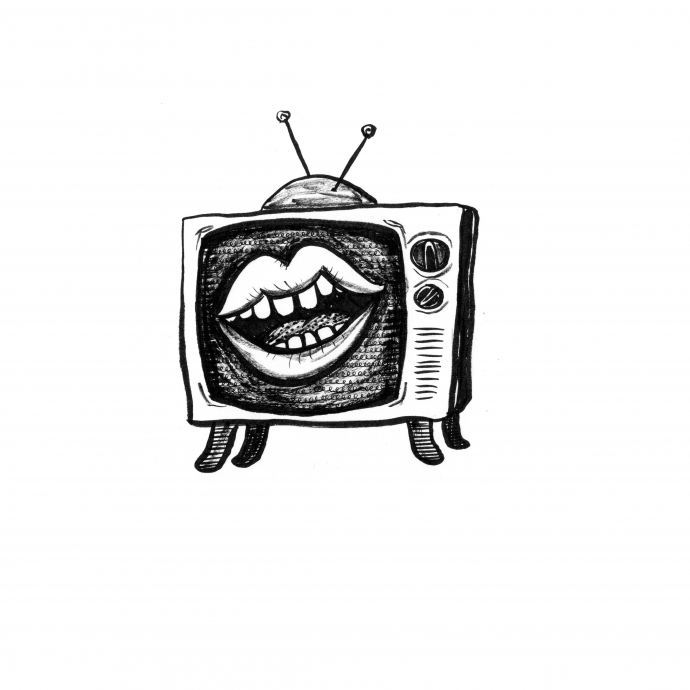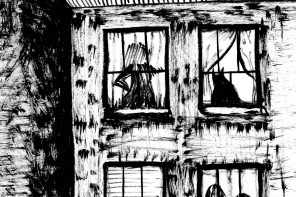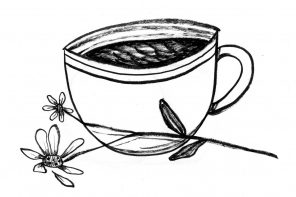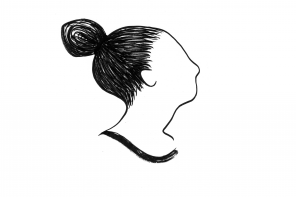Of all the well-loved episodes of The Mary Tyler Moore Show, “Chuckles Bites the Dust” looms largest in most recollections of the show. “It’s the one,” fans will tell you, the corners of their mouths turning up, “the one where the clown dies.” Their eyes are laughing already, and a giggle may slip between their parted lips. “The one where Mary cracks up at the funeral.”
This episode first aired in 1975, four years before I was born. My parents remember watching with friends in someone’s living room—shag carpet, gold sofa, ashtray on the coffee table, mixed nuts. They remember knee-slapping, doubled-over, can’t-catch-your-breath laughter. They remember side-splitting, belly-ache-after, tears-streaming-down-your-cheeks laughter. I like to imagine them this way.
In the 1990s, when Mary returns to Nick at Nite, my father insists I watch. “They took a big risk with that script,” he says, “a risk that paid off.” I sit in a room of muted colors, bangs curled high off my forehead, eyes glued to the screen.
We learn early in the episode from stoic newsman Lou Grant: “There was a freak accident. [Chuckles] went to the parade dressed as Peter Peanut, and a rogue elephant tried to shell him.” Listen. You can hear the audience begin to titter. They’re a little embarrassed, perhaps cupping their mouths with their hands, not sure if it’s permissible to respond this way.
Mary, our moral compass, says it isn’t. She shakes her head and scrunches her face at Murray’s spate of death-themed one-liners. Even Ted, unreliable Ted, dismisses the dark humor: “That’s funny, Murray, but it’s in bad taste.” Producers worried the audience might agree, but by this point, they’ve surrendered to howls and guffaws, and the longest laugh in sitcom history will soon be recorded during the scene at the funeral home.
It isn’t my favorite scene, though, that iconic moment where perpetually appropriate Mary can’t squelch her snickers during Chuckles’ eulogy. Who hasn’t had the giggles before? I get them all the time, in the most unreasonable places—church, during the sermon; school, during a math test. The fact that it’s inopportune only heightens the hilarity of the occasion.
Anyway, we don’t love Mary because she’s perfect, I reason. We love Mary because she’s human.
No, my favorite scene is this exchange between the men in the newsroom. Murray asks why Lou thinks he can’t stop cracking jokes. After all, Murray liked Chuckles. They all did. Nobody wanted him to die. Lou hikes up his coffee-brown slacks, leans against his desk, and sighs.
“It’s a release, a kind of defense mechanism, like whistling in a graveyard. You laugh at something that scares you.” I mull this over. Was I scared during sermons, scared about Heaven and the Admit One ticket I thought I might not receive? Was I scared during math tests, knowing that numbers were not my strongest subject, yet recalling what my mother said: “There are no weak subjects, only weak students”? Had fear of failure—its own kind of death—always been there, dangling above my head, like the chandelier that swayed, ever so slightly, above our dining room table?
That’s when Lou says it, like it’s the most obvious thing in the world: “We laugh at death because we know that death will have the last laugh on us.”
I write these words in my common book. They strike me as stirring and wise, and I appreciate the lovely symmetry of the sentence. Yet sometimes, as I re-read them, these words also make me cry.
My college roommate wrote in pretty cursive and pinned to our door a gender-neutral version of the Yiddish proverb, “Mann Tacht, Un Gott Lacht”: People Plan, and God Laughs. I chuckled, shook my head like I knew something about uprooted lives, U-turns at the eleventh hour. On my desk, Grace Paley’s Enormous Changes at the Last Minute dared me to read past the cover.
The fact was I wanted to like the proverb, with its nod toward chance or destiny or even divine intervention. The boy who had been coming around more often was soon to teach me about entropy, which seemed like a kind of god: “the state of randomness in a system,” he called it, “the way all things, unimpeded, proceed toward chaos.”
“Give me an example,” I said, challenging him.
Ben’s eyes played tricks. Sometimes they were brown as a canyon, sometimes green as an echo. Always, they caught a scrap of the light. “Like if you clean your dorm before you leave for a long weekend. No one’s there, touching things, making a mess, but when you come back, there’s a fine layer of dust on the floor. A certain, inexplicable grit has settled over everything.” Then, he grinned at me, feeling poetic and pleased with himself.
A friend who favored astrology over religion once pronounced that Virgos are especially vexed because they want to settle down without ever settling. “Your desire for order is bound to clash with your desire for things that, in and of themselves, lead to disorder.”
“Give me an example,” I said, like the Virgo I am.
Her eyes were blue as a stream, but her voice had no ripples in it. “Love.” And then, with a little laugh and a wave of her hand: “Love wreaks havoc on everything.”
I had planned my life so diligently. I researched PhD programs in Psychology while I was still a sophomore undergrad. This was the compromise major, talked down from a doctor of pediatrics or cardiology. My parents had decided to see the “science” in it, while I had decided to see the “social.” No deviating now, only finding the grindstone and tipping my nose right down.
I would need a husband, too, in not so long, if I planned to succeed in that Noah’s Ark world of gendered pairs. I didn’t dream him, though. I drafted him on paper with a protractor and ruler. I told a girl I worked with at the department store: “I’m not picky, but I do have standards. I’d like a tall man with a boyish face, brown eyes, curly hair, preferably left-handed—because southpaws tend to be more artistic.”
She sputtered at first. I thought she was coughing. Then, she laughed the way a volcano erupts.
“What’s so funny?” I asked and meant it.
“Well, not leaving much room for kismet, are you? Let me guess: you’ve also chosen his name?”
“Charlie,” I said, without missing a beat. “It’s always been one of my favorites.”
Maybe we should change the proverb: Some people plan, and their friends laugh. Strangers try to be polite but still end up chortling.
In a couple of years, I’d open a fresh pack of pens, sharpen a neat row of pencils, and sit down at my desk to complete those applications. I loved how pristine they looked, the dark lines on bright paper, the bubbles like open mouths that I would soon, deftly and completely, fill.
In a couple of years, I’d meet a man named Charlie at that same department store, clock his brown eyes, the curls he tried to comb straight, to no avail. I’d notice, too, the long shadow he cast on the glossy white floor, then wait with breath suspended in my chest as he reached for a pair of scissors with his—I could hardly believe it—left hand.
If there was a God, He must have been busting his cloud-shaped buttons as He watched me feed those applications into the sharp teeth of the paper shredder. So began my enormous changes at the last minute. “Is it too late?” I asked my adviser, banging hard on his half-closed door, upsetting the calendar. “I want to apply to grad school in creative writing instead!”
If there was a God, He must have been rolling in the aisles of that out-of-sight sanctuary when, on the day I was supposed to marry Charlie, I pronounced “I don’t” instead; when I gazed across the room at the woman I loved, suddenly and undeniably, then mumbled, “I’m sorry” into the phone. The best-laid plans, you know? I hadn’t known, but then all at once I did. I was hardly surprised to hear my own voice say: “Something unexpected has come up.” I was hardly surprised that even through my tears, I was laughing.
“What’s the secret to staying together so long?” an old friend asks my partner and me over lunch at our favorite taco shack.
Angie pours sangria into empty cups. “It must be different for every couple, don’t you think?”
“No—I mean for you. If you had to say in one word why you’re still together after fifteen years, what would it be?”
That’s when I buzz in, like a star contestant in a quiz bowl. “Laughter!” They laugh when I say it, but I’m serious. “The answer is laughter.”
Anna sips her wine-punch. “What do you mean exactly?”
“Well, we’ve been broke, and we’ve been sad, and we’ve been stressed, but humor is the constant. I don’t think a day has gone by in all this time that Angie hasn’t made me laugh.”
“She’s sentimental. Don’t trust her,” Angie sighs, which only makes me smile.
“No, I mean it. If you always laugh with the person you love, I think you’ve got a real shot at long-term happiness.”
Anna reclines in her chair, stirring the fruit in her cup. But Angie leans forward on the table, challenges me. “What about the day we went to my Granny Bessie’s funeral? We didn’t laugh that day.”
But as soon as she says it, the memory returns, and our lips start to quiver in unison. We become, for a moment, one.
“What am I missing?” Anna prods.
“It was a small-town, Southern funeral, and in his zeal, the preacher proclaimed, ‘Bessie, like all good women, was attracted to Jesus!’ Angie and I took one look at each other, and then we couldn’t look again. We were shaking all over, that kind of terrible, silent laughter that seizes your whole body. And yet, how could we have gotten through without it?”
“OK, OK, bad example,” Angie concedes. “That was shameful, but it couldn’t be helped.” More stirring of fruit and sangria-sipping. “What about the day we had to put Ollie down?” This is a fresher pain, and her voice is soft. “We didn’t laugh then. All we could do was sob.”
I nod my head, somberly now. Oliver—Ollie to his familiars—the big, glorious cat we loved for so long, who turned gaunt and blind nearly overnight from a tumor swelling inside his skull. For years, I told Angie there was a face Ollie made that looked exactly like Jack Nicholson’s face at the end of The Shining. I’d offer to freeze-frame this image on the DVD, but she called me bonkers—a word that made us laugh—and declined to see it every time.
The fact was, even on that most miserable of days, when we crawled back into bed for hours, when we seemed to weep in shifts, passing our surviving cat, bereft without his brother, back and forth between us—even then, I remembered something. Late in the day, Angie turned to me and said, “You know, when the vet gave him the drug that stopped his heart, I saw what you meant for just a moment.”
I patted my eyes with tissue. It hurt by then to blink. “I’m not following.”
Her nose burned. Her cheeks burned. The rest of her was pale. “Well, at the very end, I do have to admit that Ollie looked a whole lot like Jack Nicholson.” And then, for just a little while, our keening gave way. We folded into each other. Our laughter rocked the rumpled bed like waves.
Julie Marie Wade teaches poetry, creative nonfiction, and hybrid forms in the creative writing program at Florida International University. She is the author of ten collections of poetry and prose—most recently Same-Sexy Marriage: A Novella in Poems and The Unrhymables: Collaborations in Prose, co-authored with Denise Duhamel. A recipient of the Lambda Literary Award for Lesbian Memoir and grants from the Kentucky Arts Council and the Barbara Deming Memorial Fund, Wade makes her home on Hollywood Beach with Angie Griffin and their two cats. In 2020, The Ohio State University Press will publish her book-length lyric essay, Just an Ordinary Woman Breathing.




